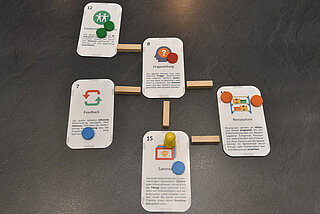
EMPAMOS toolbox guides workshops to success
How game design elements trigger self-motivation
By Thomas Tjiang
Nuremberg research project EMPAMOS (Empirical Analysis of Motivating Game Design Elements) has been uncovering design and rule elements in games for the first time. To this end, computer science professor Dr Thomas Voit at the Nuremberg Institute of Technology Georg Simon Ohm has been using artificial intelligence (AI) to reveal the inner workings of board games. Based on the processes and methods that have emerged, Dr Voit has also established a special EMPAMOS workshop programme.

The idea for a workshop programme arose almost inevitably from the EMPAMOS project. Professor Dr Thomas Voit wanted to apply absorbing game elements in an entirely different scenario. The EMPAMOS training programme was developed from the research results obtained at the German Games Archive Nuremberg. It is an analogue and digital game design toolbox for organisational, team and personnel development. “Game inventors know how to create motivation and motivating systems, and we are now applying this knowledge in a completely new context.”
Gameful motivation instead of gamification
Given the use of playful elements, the “gamification” label might seem appropriate for the new workshop concept. But Dr Voit is not comfortable with this. “Gamification is about trying to bring the fun of games to the working environment.” His approach is different: “We want to use the patterns found in games to motivate and to design motivating systems. We are applying all of this to work processes – in other words, the real world.” He prefers to use the term “gameful motivation” for this. Accordingly, the toolbox is not based on simple rewards – instead it stimulates the ability of workshop participants to motivate themselves. “This means that change processes in organisations can be put on a more future-proof footing.”
Toolbox triggers creativity in workshops

This x-ray of the world of games has so far led to the identification of over 100 game elements and more than 1,800 motivationally significant combinations. The AI’s machine learning method has enabled recognition of hidden patterns in game instructions. The EMPAMOS toolbox has been developed on this basis as a means of approaching challenges in a playful way. The toolbox makes it easier to hold team and organisational development workshops. Self-organised teams get ideas for designing their own work activities in a manner likely to motivate. This also involves the use of a computer, specifically an AI assistant that boosts the creative process during idea generation and concept development. “The AI knows which game design elements have a proven motivating effect and therefore by implication also the unknown factors, the terra incognita. Game inventors are always looking for something new, while businesses want the security that comes from established game design elements and combinations.”
Successful practical implementation
The EMPAMOS toolbox has already proven its practical applicability. A game-based exhibition format has been developed for the Tübingen City Museum, tackling the controversial topic of Tübingen during the Nazi era. It makes it possible for adolescents and young adults in particular to grapple in an interactive and personal way with this dark period in the city’s history.
Another project has involved making the drug and addiction counselling services provided by the Nuremberg-based organisation Mudra more motivating for clients. Instead of the previously rigid logic of mandatory counselling sessions, a playful approach has been established. Now, service users have an autonomous, self-determinant role to play in helping to shape the course of their counselling sessions, which has a self-motivating effect.
Modular toolbox for practical use

A modular training programme has been created so that moderators can successfully lead EMPAMOS workshops. The programme begins by familiarising participants with the specific rulebooks as well as the game design elements and how they can be applied in organisations. Module 2 covers the professional application of the AI assistant for trainers and consultants. Further modules are relevant for those wishing to become a “Certified Trainer for Gameful Motivation”. Exchanges with other trainers and involvement in further research are also elements of the training programme.
EMPAMOS research project
Prof. Dr. Thomas Voit teaches and researches at the The Nuremberg Institute of Technology on the subject of gamification. In cooperation with the German Game Archive Nuremberg, he has been leading the research project EMPAMOS since 2016, which analyzes the text rules of more than 30,000 board games with the help of machine learning methods.
Training & Consulting for game changers
Modular training for the efficient use of the EMPAMOS Toolbox.
About the author
Thomas Tjiang is business and local journalist and communication consultant. Since the start of the 1990s, he has worked for all types of media, such as daily and monthly press, the radio, TV, news agencies and on-line editorial offices. The freelance expert for literature and communication science has lived in Nuremberg for 30 years.




